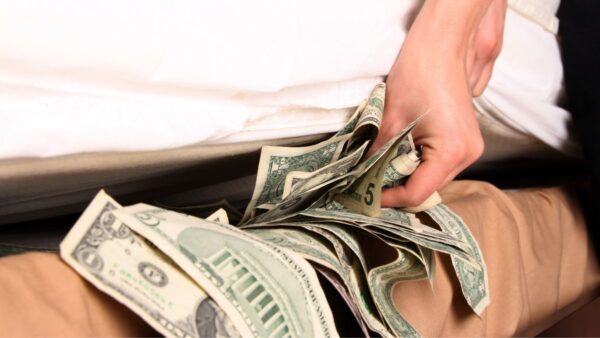Before banks, it wasn’t uncommon for people to keep their life savings hidden in their homes, but today, is this a financial practice that should be kept alive? According to an American Express Spending and Savings Tracker study, 43 percent of Americans keep their savings in cash, and 53 percent of those who keep their money in their house “plan to hide bills in a secret location at home.”

Recently, 2 Chainz claimed he discovered his late father’s hidden cash stash in a broken pipe in his house — 11 years later. The story of the “It’s a Vibe” rapper sheds light on the reality that it may not be all that uncommon for people to be in the habit of saving money in their homes, through items such as mattresses and floorboards. Is this a safe and recommended practice in today’s times? Financial experts weigh in.
Stashing Cash at the House
Sean Gilbert, a chartered financial planner and founder of Select Wealth Managers, says keeping money in the house can be a good move, if done correctly.
“Stashing some cash in your home can be a smart financial decision as it can provide you with some peace of mind if you ever run into an emergency situation,” Gilbert told Finurah. “Having physical cash on hand can provide you with instant access, whereas having your money in a banking account involves extra and possibly lengthy steps to get access to it.”
As an example, a person who has a savings or investment account with withdrawal stipulations would need to call a “financial advisor or banker to withdraw the money, which can take up to three business days,” Gilbert explained. This is where, he said, it literally pays to have actual money available, making it easier to pay for things instantly without the wait.
Jasmine Johnson, an accredited financial counselor, agrees.
“I believe every home should have a safe which holds life insurance policies, a will and a stash of cash,” Johnson said. “The amount would depend solely on the person or family. For a single person, I would suggest $500. For a family, I would suggest at least $1,000. I also encourage everyone to have at least $20 cash in their wallet for gas or even helping someone in need.”
The point is that only some of money should be kept in the home because it’s never wise for individuals to keep all their eggs (re: life savings) in one basket, and keeping a substantial and valuable sum outside the bank isn’t necessarily a bad idea, experts say.
A Safe is Safest
Johnson says it’s crucial to stash your cash correctly by keeping it in a location where no one can easily access it. “You know your house better than anyone; get creative,” she said. “I suggest keeping your money housed in a safe that could cost anywhere between $40 to $75 for a decent fireproof safe.”
2 Chainz’s dad stashed his cash in pipes at this home. When he died in 2012, reportedly no one knew about the cash. The rapper only found it when he had to repair the pipes in 2023. Johnson said it’s best when your family knows about the saved cash.
She advises setting up a safe with a spouse and notifying a trusted friend with the combination and location just in case they need to open the safe on the individual’s behalf. It’s also essential to keep a ledger on file to keep track of the funds going in and out of the safe. This will help ensure all money is always accounted for.
Gilbert does not suggest hiding money in empty containers or sock drawers as it allows money to get easily lost or forgotten.
How Much to Stash
“Having around $1,500 to $2,000 [in] cash is sufficient enough to help you during an emergency if needed,” Gilberts said. “Building this up is great, but you also don’t want to keep large amounts of money on hand as if it becomes misplaced or stolen; that is a greater financial loss.”




